You might have seen him, but you probably wouldn’t have noticed him. Snapping away in the corner of a new restaurant, making sure there’s enough natural light falling on his starter. He’s the anonymous, faceless young man who communicates almost entirely in photographs and hashtags, and he has quickly become one of the capital’s most trusted critics. Few know his name; for tens of thousands of us he is simply: Clerkenwell Boy. He might not be the superhero London’s overblown foodie scene needs, but he’s the one it deserves right now.
@clerkenwellboyec1, as he’s known to his 110,000 Instagram followers, @Clerkenwell_Boy to the 10,000 on Twitter, is the epitome of the 21st-century social media star. He is hip, shiny and to the huge majority of people who don’t fall in the Venn diagram intersection of self-defining “foodies” and “Instagram addicts”, completely baffling.
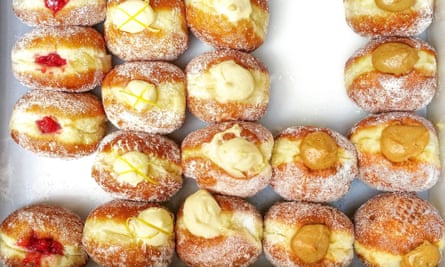
He seems to eat out three times a day, and photographs 90% of what he eats. At the time of writing, in the past 48 hours he has posted from Jamie Oliver’s 15, Ozone coffee, Yauatcha, Shoryu Ramen, Egg Break and Rex & Mariano. His exhortations to eat those doughnuts or that confit potato have helped to make stars of certain dishes. A brief scroll through his feeds is hunger inducing but exhausting. Everything is an event; even a holiday Cornetto is framed like the Parthenon.
“It’s just a kind of diary of what I’ve been eating,” he explains. It sounds innocuous, but in a world measured in likes, favourites and RTs, selection means approbation. The updates of Clerkenwell Boy’s gastronomic life have become must-checks for those interested in the capital’s restaurant scene. It sounds insufferable, and it must have professional photographers gnawing their tripods in frustration. But London might now be the best city in the world in which to eat out, and his feeds are one of the best guides to what’s hot. Jamie Oliver has said: “I watch his pictures with total jealousy every week.” For Nigella Lawson, he is “essential”. Even our own Nigel Slater says he looks him up to know where to go.

But who is the man behind the munching? Tim, it turns out, is an unprepossessing Australian in his early 30s. He moved to London 10 years ago, but only took up social media in 2012. “I went to a supper club, and at the end all the guys asked what my Twitter and Instagram handles were,” he says. “I didn’t know what they were talking about.”
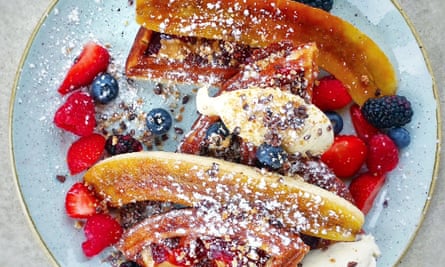
Although he started with Twitter, he prefers Instagram as a format. “Twitter is useful for news, but there’s a lot of negative comment. Instagram is a much more positive space. You don’t get as much trolling or complaining.” Put differently, you might argue that Instagram gives people less right of reply. But others clearly agree, which is why they have followed him in such droves. In Clerkenwell-Boy-world, nobody turns down dessert on doctors’ orders, spoons sad leftovers from Tupperware or weeps over the bill.
And while “followers” seems a narcissistic measure of success, these days it is often followed by hard cash. Instagram is awash with celebrities turning their social media profiles into good livings. Mostly these are in fitness, diet and that nebulous contemporary metier “lifestyle”. The Body Coach, Joe Wicks, makes nearly £1m a month from selling diet plans he popularised on Instagram. Made in Chelsea stars have become social shopfronts, promoting whichever brand has paid them. Is Tim not tempted to take the money and run?
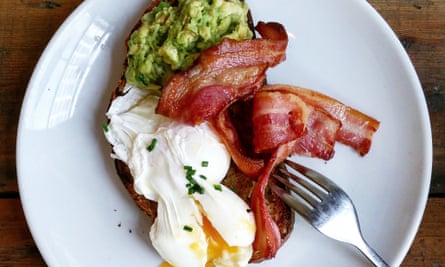
“It obviously happens a lot in the industry, and it’s tempting. I have been approached a lot, mainly about doing a book or an app,” he says. “For me it’s been a hobby, a passion. If you accept a lot of free meals it can be hard to give honest feedback. I never post anything I wouldn’t endorse, or accept a free meal that I wouldn’t happily pay for myself. I like to think that my followers trust me. Also I tend not to go to bloggers’ dinners because everyone has cameras, and it would be harder for me to remain anonymous.”
It strikes me as an ever-so-slightly slippery response, with a fair bit of leeway for Clerkenwell Boy to accept hospitality. He does do tie-ins with certain websites and causes, but tries to be clear what is being promoted, and he has never taken money for posts. Earlier this year he posted a picture of a wedge of receipts as evidence that his gourmet existence comes from his own pocket.
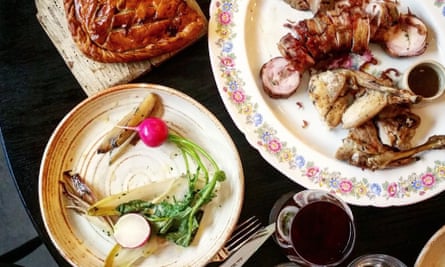
It helps that he has an alternative income. By day, Clerkenwell Boy is a consultant and helps small businesses with social media. Do his colleagues know they have an Instagram star in their midst? “They know I’m really into food,” he says, “but they don’t know about the social media. I prefer to keep them separate.” For all the apparent glamour of his life, he eats like many of us, with a few favourites he returns to time and again. The difference is that where we might go to the pub round the corner or the serviceable local Italian, Clerkenwell Boy’s haunts are “The Quality Chop House, Morito, St John Bread and Wine”.
He also insists that the traditional critic is far from dead. “With critics sometimes I agree, sometimes I disagree, but I’d never base my taste on one review – although it’s good to be aware of the worst that could happen.” One might expect the old guard to resent the whippersnapper with his phone (“a Samsung; I don’t own an actual camera”), but he says he has a good relationship with mainstream writers. “Traditionally they haven’t liked bloggers because they’re doing something similar. But Instagram is more about ‘this is so good’, or ‘this is hot right now’. It’s a different kind of critique.”
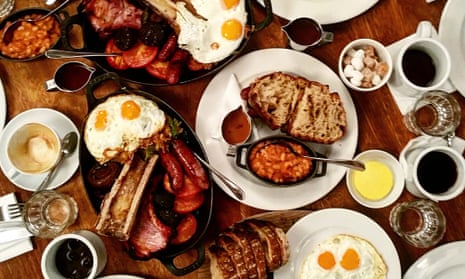
Comments (…)
Sign in or create your Guardian account to join the discussion